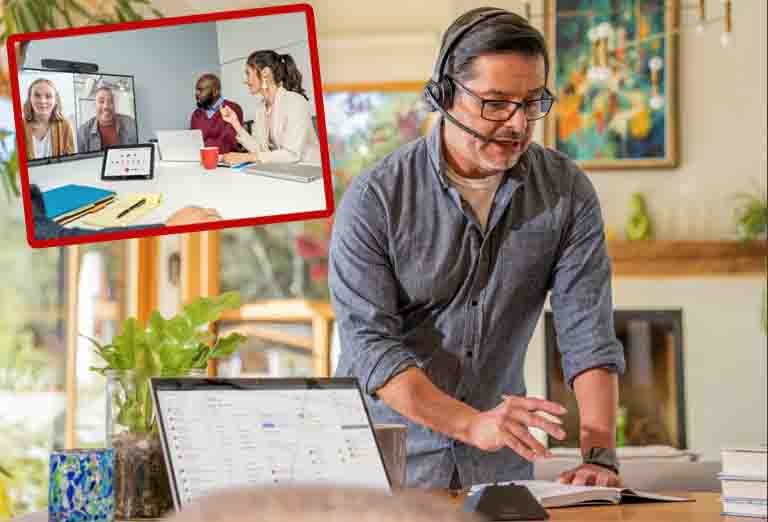EVER been bothered by a video call when someone walks back and forth in the back while in the middle of a serious discussion? Or answering a phone while a person was making a point. Or leaving the microphone on while shouting for a glass of water? These are but a few of the unplanned, unwanted distractions that happen in the world of remote working.
“The shift to hybrid work was so abrupt, we’ve not really considered how our behavior should change to accommodate this new way of working. Should we be amending our behavior to make hybrid work and hybrid meetings feel more normal?” Samir Sayed, Managing Director for ASEAN, Korea, Emerging Markets & Pakistan for Hybrid Work Solutions at HP pointed out.
Communication technology expert Poly and tech maker HP collaborated with Debretts, the British professional coaching company, publisher, and authority on etiquette and behavior to create “The New Etiquette For Hybrid Work”–documenting ways to meet the challenges of hybrid remote work considering everything from tiny workspaces, pets and children and bad connections. The report asked “hybrid working is designed to exploit the best of both these worlds, freeing employees from the routine working week, but still maintaining a foundation of office life. With the new emphasis on communicating online here to stay, how should we behave?”
“Thinking about how to make hybrid meetings feel more natural will create an equal meeting experience, whether people are in the room or dialing-in from home, which can come down to employers providing staff with the right technology and training,” Sayed added.
The comprehensive guide offers insight into everything from how to behave on video calls and how to dress yourself and your background, to body language tips and the importance of eliminating distractions.
“It is clear that hybrid working offers many benefits, including greater flexibility and a better work-life balance. However, that’s not an excuse to let etiquette slip, and standards should stay the same regardless of where you’re working from. What’s the dress code when working from home? How do you eliminate distractions and present a professional faí§ade online? This guide seeks to answer these questions so that both staff and employers can get the most out of a hybrid working arrangement,” Liz Wyse, Etiquette Advisor at Debrett’s elaborates.
The guide suggests the following as the etiquette for hybrid working.
- Give a Royal wave: Ending a video call can sometimes feel a bit awkward. To make calls feel more friendly and inclusive, you can soften the abrupt finality of pressing ‘End call’ by giving colleagues a wave goodbye.
- Avoid video motion sickness: Stay in a fixed position during video calls. Carrying your device while you answer the door or wander around the office during video calls risks giving your colleagues a bad dose of motion sickness.
- No meeting munchies: You should try to avoid eating — you don’t want people to focus on the contents of your lunch rather than what you’re saying. It’s preferable to eat before you join a meeting.
- Beware the danger of diversions: Your home is full of diversions. Be it domestic chores, the garden or visits to the fridge — it’s all too easy to wander around doing jobs or making snacks, which ultimately distracts you from your job and impacts your productivity.
- Eliminate virtual background clutter: Indulge in a little set-dressing before your call. Evaluate your video background. Try to eliminate chaotic bookshelves, discarded clothing, empty take-away containers and distracting artwork. You want your colleagues to focus on you, not your background.
- Say no to stoic sickness syndrome: Do not struggle into the office if you have got a cough or cold or anything contagious. Nobody will applaud your stoicism.
- No meeting multitasking: It’s inappropriate to multitask during meetings — for example looking at your phone. It is also very bad form to carry on working while on a call; everybody will realise your mind is elsewhere and hear the incriminating clatter of your keyboard.
- Mute your workmates: Noise in the office can be distracting when joining calls. It’s quite acceptable to politely ask your colleagues to keep their voices down and to turn down their radio or music.
- Dress for success: People will choose to wear more relaxed, comfortable clothing when working from home, but it’s important to be aware of the psychological impact of truly letting yourself go. Aim to dress as if you are in the room with other meeting attendees.
- Embrace long pauses: Don’t be alarmed by long pauses during meetings and scramble to fill them with chatter; they are an invaluable way of giving people space to interject or expound.
“With people increasingly splitting their time between the office and home, how we conduct ourselves at work has changed drastically,” Wyse concludes.





